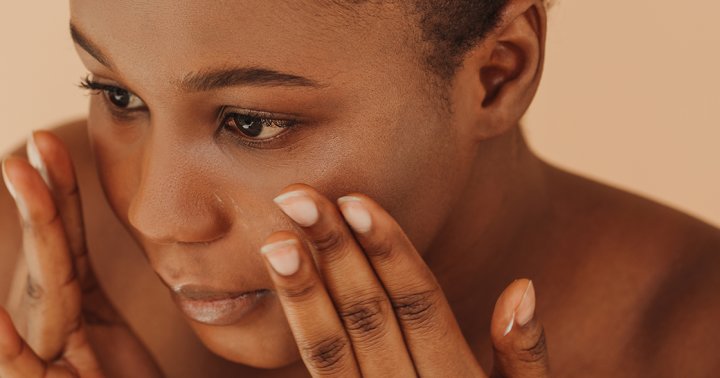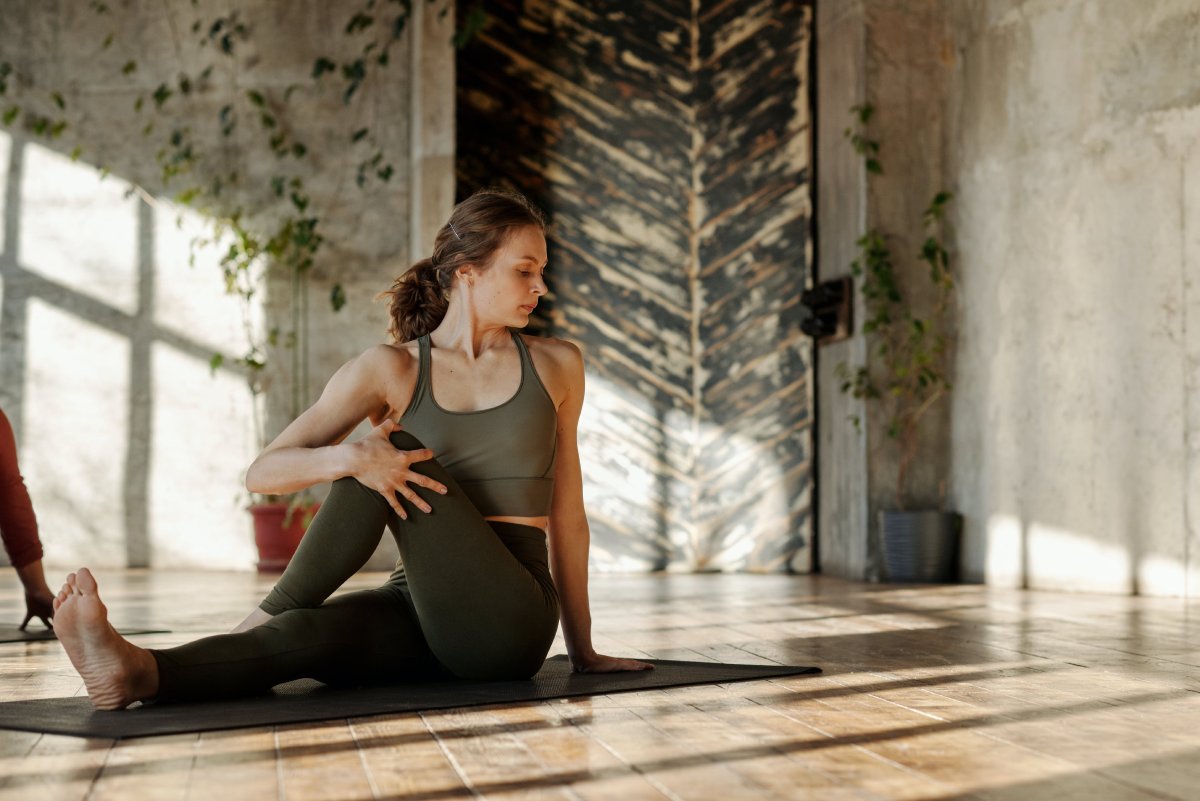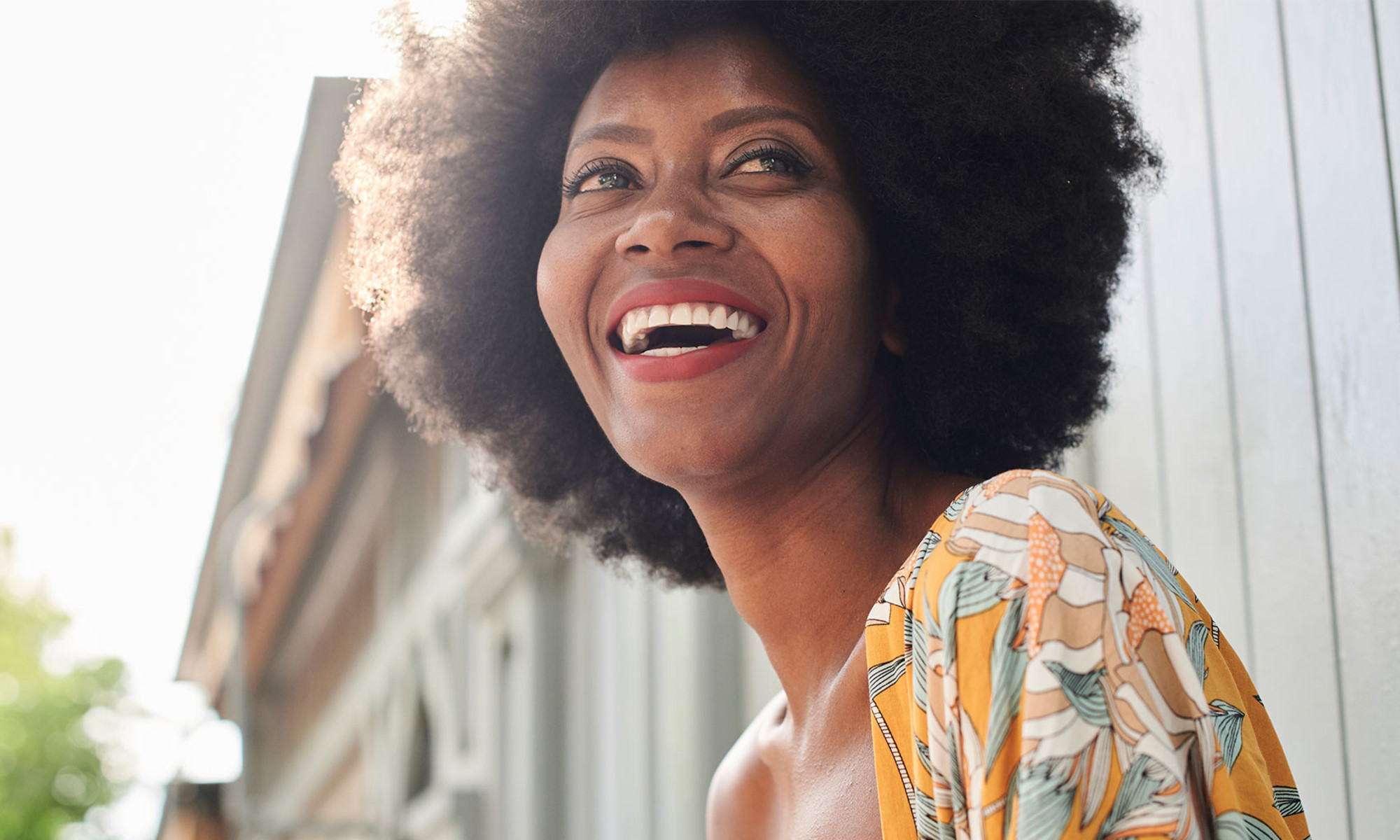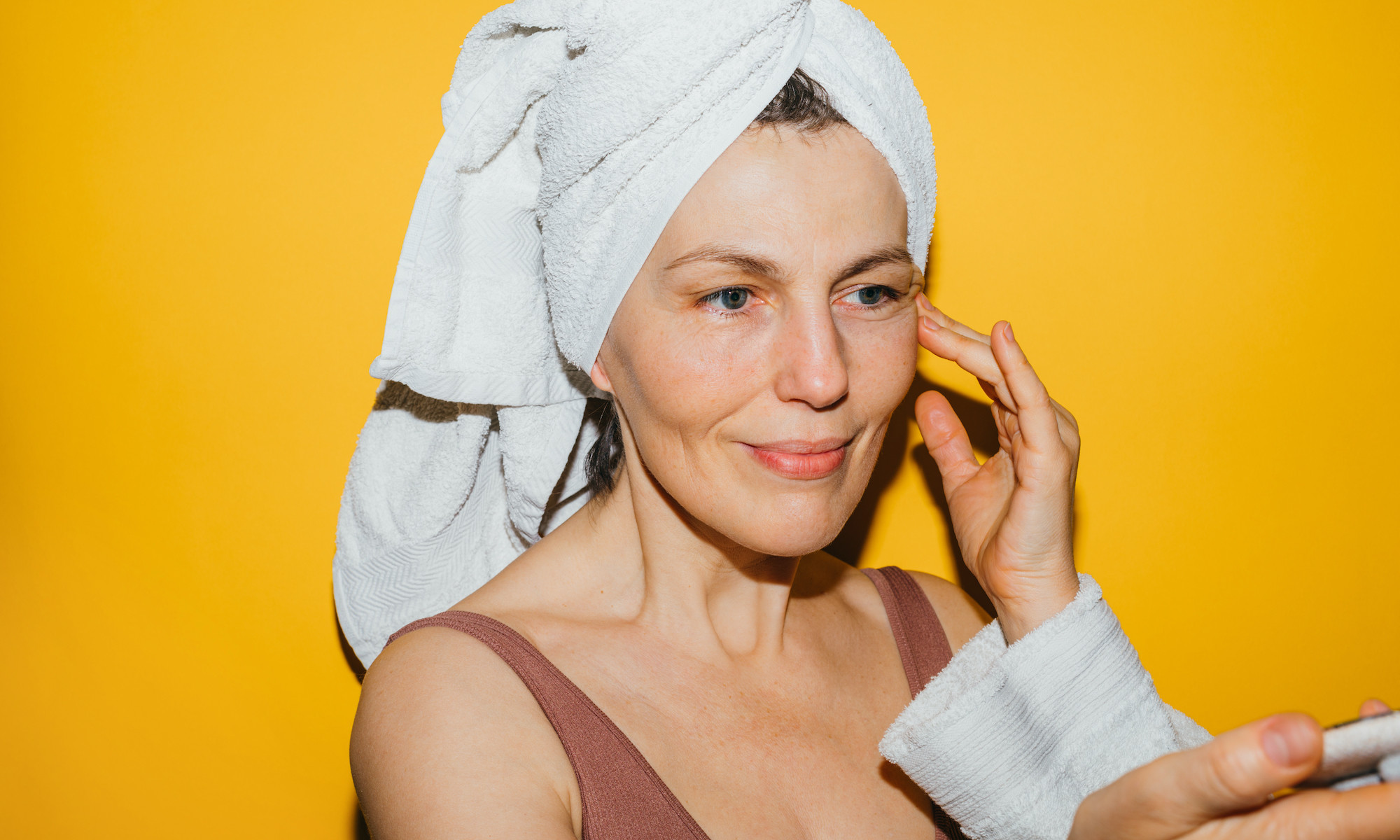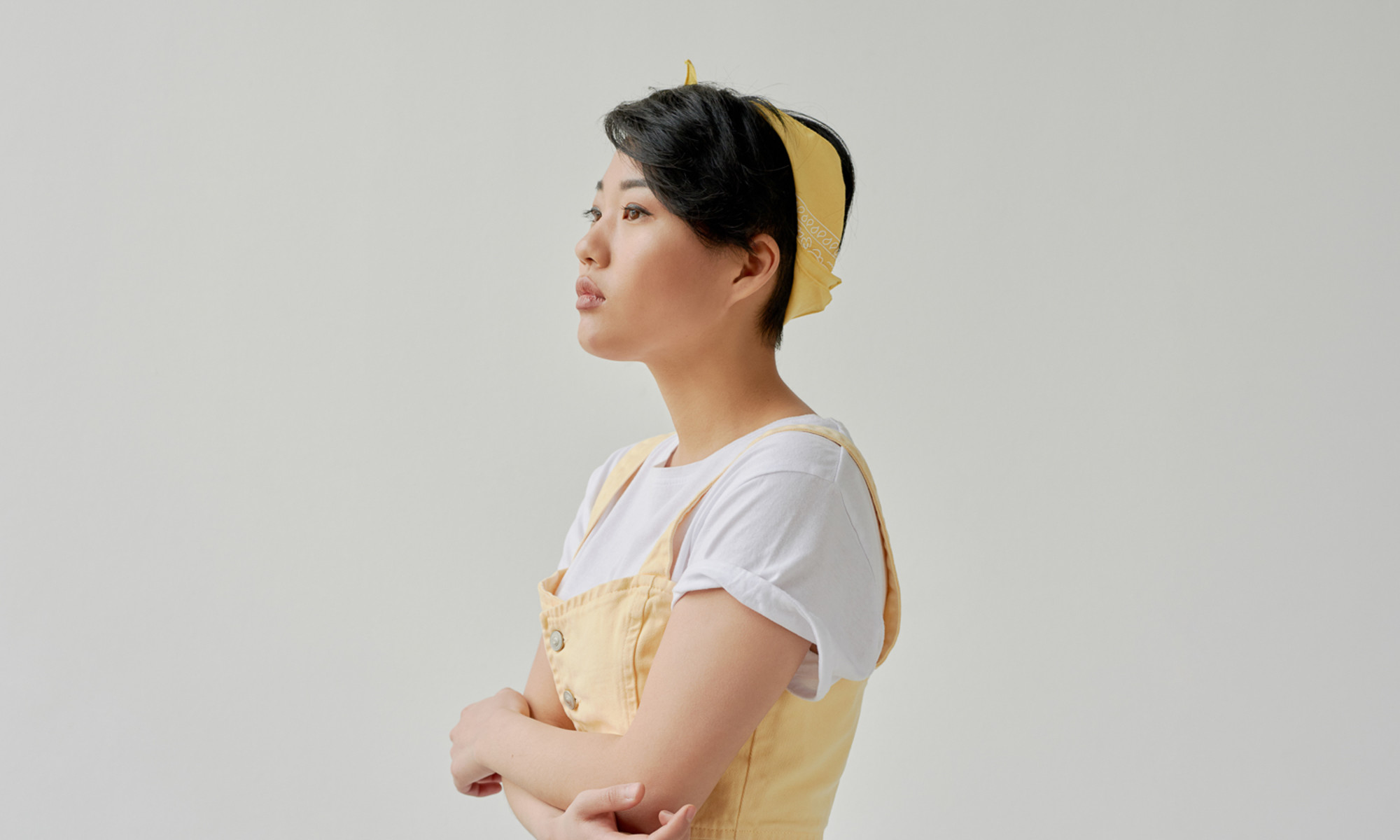Forever Forward & Living A Balanced Life | Nate Checketts | Better Man Podcast Ep. 011
How do you push yourself and your goals forward while living a balanced life? This episode features Nate Checketts, the Co-Founder and CEO of Rhone, an activewear lifestyle brand founded on the ethos “Forever Forward”; a phrase that perfectly...

Episode 011: Forever Forward & Living A Balanced Life | Nate Checketts – Transcript
Dean Pohlman: Hey and welcome to the Man Flow Yoga podcast. It’s your host, Dean Pohlman. And today, I’ve got a special guest, someone who I go pretty far back with, Nate Checketts, the CEO, and I am assuming to be the founder as well of Rhone. So, Nate, welcome to the show.
Nate Checketts: Thanks, Dean. Yeah, I’m psyched to be on with you. It’s good to see you looking fresh. We’re both in kind of our gym/office. So, a good setup.
Dean Pohlman: Yeah, I was going to talk about that. So, you have the home gym setup as well. What all do you have there?
Nate Checketts: So, when my wife and I moved into this house almost a year or so ago. And there’s a room over our garage. And she was like, “Okay, this is your room. You can do with it whatever you want. You can turn it into a gym, you can turn it into an office.” And I was like, “You know what? I never thought about that. But yeah, let’s just make it the same place.”
And so, we’re big fans of Peloton in this house. So, we got the bike and the tread, and I’ve got a Rogue rack and a tunnel and an Icon vault and a Concept2 rowing machine and plenty of things to have fun with and really no excuses, and then a big wide-open space where I do some man flow yoga.
Dean Pohlman: So nice.
Nate Checketts: So, it’s a good reason to stay active.
Dean Pohlman: Yeah, I’ve got most of those things. I got my wife at Peloton three weeks ago. I haven’t tried it yet. I’m looking forward to trying it out soon. I also have a Rogue rack and I have a Concept2 rower, so…
Nate Checketts: Awesome.
Dean Pohlman: And a man flow yoga mat.
Nate Checketts: So, when you get on there and you get your hand, I’ll set up my way because it is fun to ride with other people or Rhone with other people. We actually had a group at Rhone where we’ll do some Rhone sessions together. And I love the guys at Peloton. We’ve had a great partnership with them for years. In fact, you’ll see a lot of the male riders are wearing Rhone, and we’ve been their number one men’s partner for the last two years.
Dean Pohlman: Nice. Cool. Well, I want to touch back on that subject of you growing Rhone in partnerships eventually, so I like to tell people how we met. So, I messaged you, I messaged Rhone in 2016 on Facebook because I saw the brand. I was like, “This is cool.” I feel like this is a really good fit for Man Flow Yoga. And I think it took a while but eventually got a conversation going. And I think I was speaking with your brother Ben initially, and then eventually, we got to work on a collaboration. It was called the Rhone series.
But since then I’ve renamed it to New to Yoga, Not to Fitness because that was the idea. We wanted to show guys how they could easily integrate yoga with what they were already doing. And it’s one of my more popular series of YouTube videos. So, thanks for that inspiration way back when. Yeah, and then we finally…
Nate Checketts: Yeah, I remember that. And it’s funny when we started interacting, I think right around that time, we had just moved into a new office space. The office space itself was not new. In fact, it was kind of like this warehouse space inside of a facility called Chelsea Piers, which is a big sports facility. We have one in New York, and then they have one in Stamford, Connecticut.
And so, they gave us kind of this big open raw space. There were a bunch of mice running around, and we kind of set up tables and desks. But I remember when we got in there, I thought I could basically take up whatever sport I want to because, for 10 to 12 hours a day, I’m going to be in this facility. I could learn how to ice skate finally, or I could pick out kickboxing or whatever it is.
And I remember thinking, I’ve always wanted to really learn how to do yoga and I consider myself to be pretty active. I was an athlete growing up, but I had never done yoga. I believed in mobility. And I think this is something that you and I connected with is, I’m going to hot yoga classes and at the moment, it’s the only kind of classes they offered. And it was basically me and 35- to 50-year-old women, and I was the only guy in the class. And I remember getting in there, and these women were amazing at yoga, like they clearly had been taking for a while, had developed to great practice.
And I think the first day, the instructor was like, “Now if you have a headstand in your practice.” I was like, “I don’t know if I have a headstand in my practice,” but I wasn’t one to shy away from it. So, I immediately tried to go into a headstand and fell and nearly knocked a window out.
Dean Pohlman: Nice.
Nate Checketts: But I did yoga, like, I don’t know, three to four times a week while we were there for two straight years. And by the end, I was still the worst one in the class, but I just really enjoyed it. I learned to just enjoy and appreciate the benefits of yoga and I know you had kind of a similar experience. It’s just not a sport that you see heavy male participation in, but it’s growing every single year as we understand the benefits of mobility and longevity. And yeah, so we’ve been psyched to partner with you, and I actually have your book right here. Look at this.
Dean Pohlman: Oh, nice, yes. Thank you.
Nate Checketts: So, looking good in the versatility shorts.
Dean Pohlman: Yes. We made sure to, of course, get Rhone on there. Yeah, that’s awesome. So, for you, for the benefits, was it the breathing focus? Was it the flexibility? What did you really notice more so of?
Nate Checketts: I think it was just similar to what you framed it, it changed my perception of fitness because in my mind, growing up as an athlete, a good workout was one that left you really breathless, that you kind of really pushed your heart rate up as quickly as possible, or where you just felt like you couldn’t walk the next day because you lifted and punished your body. And I don’t know. It was really a ride around the stage. I was probably mid-30s, and my paradigm of fitness started to change.
And really, what I viewed from a fitness perspective is certainly, I wanted to continue to look the way I wanted to look esthetically, but more than anything, I wanted to feel well, I wanted to have energy, I wanted to be able to pick up my kids when they would come and run to me or jump on my back or do the sports that I continued to love doing and be able to do them for a long time. And so, when you’re in high school or maybe in college, exercise was about achieving some net effect or net result of how I wanted to look when I took my shirt off. It was not about that at all for me anymore. It really was so much more about I want to feel great.
And yoga has this sneaky way of doing all of these things, making you look the way you want to look when you take your shirt off and all those things, but it improves mobility, flexibility, and you can get your heart rate up and you can definitely get your breath working, but it sneaks up on you. And so, I just loved the idea that I was combining a meditation practice and an exercise practice into one in a way that I don’t think any other fitness modality offers.
Dean Pohlman: Yeah, I think you’re right on with that. I think just with the way yoga is done, sure, there are lots of things that work on flexibility and there are lots of things that work on balance, but in terms of combining the mindfulness aspect with breathing and with mobility work with balance and all into one, yeah, yoga is just the nature of holding poses, basically holding isometric exercises for a prolonged period of time, and the emphasis on breathing and keeping that slow, controlled nasal breathing as opposed to just going out with your breath. Like that’s just something that’s so unique. And yeah, the benefits are easily noticeable. It’s interesting that you mentioned changing perception of fitness and shifting from feeling good. I remember when we met up, I think, it was 2017, you were going to…
Nate Checketts: In Austin.
Dean Pohlman: Yeah, in Austin. It was an Onnit trainer, and Primal Swoledier was there and a few other fitness entrepreneurs who lived in Austin. And I remember doing that workout, and I will talk about myself, it’s a whole nother story because at the time, I was like 165 pounds and 4.5% body fat and I couldn’t even do a quarter of the workout because my body was just only for yoga, totally used with something else. But I remember you saying then that, yeah, the older I get, the less I want to do a workout that just kills my body. And so, I’m wondering what caused that shift for you? Was it becoming a dad? Was it like you had your hot wife and you were like, she’s still going to be there? Or what was it?
Nate Checketts: Well, I think it’s a combination of a lot of those factors. I think part of it also is just a maturation process that takes place when you’re younger– and I think every guy is wired differently, but I certainly was wired very competitively. And playing athletics and sports, it was like I’m competing for a position on the field. And then I’m on the field. I’m competing against the guy across from me.
And so, you start to view kind of the guys that you’re coming in contact with as your competitor. You got to beat them. You got to outperform them. And what’s interesting is past the point of athletics, I’ve really learned to appreciate and love the fact that true fraternity is one of support, and the person that you’re really in competition with as cliché as it sounds is yourself, and trying to improve and get better each day.
And don’t get me wrong there, I still love to make sure I sweat it out and work really hard, but I think sometimes and you certainly see this in a lot of fitness brands where the only aim is suffering. And I don’t believe in that. Suffering to what end? If you’re trying to increase your VO2 max, great. There’s a reason for doing that and there’s a rationale. Maybe you’re trying to bring up your lung capacity or your oxygenation or whatever it is.
But I think long-term health longevity is really about balance and doing a combination of different modalities that bring you joy and happiness, keep your body moving and working, and kind of your joints appropriately lubricated. And it’s why recovery and sleep and hydration are equally as important parts of the other side of the equation. And frankly, it’s why I think at Rhone, we take a very different point of view than every other activewear brand out there, which is kind of only about what’s happening in the gym when you’re running or the performance. We really think about the mental health aspects. We think about the recovery aspects and certainly the movement. But a full approach makes a big difference, and we found that that really resonates with most guys.
Dean Pohlman: Yeah, I completely agree with you and I think that general wisdom, number one. I think also that if you look at people who are still working out and feel good in their bodies, and if you just look at the science, all of these things say that, hey, yes, you can push yourself sometimes in your workouts, but you also need to do medium and low-intensity workouts and you need to recover, and as much time as you spend working out, you should spend an equal amount of time recovering, doing something aimed at recovery. Yeah, and I think that…
Nate Checketts: And also, you should enjoy it, right?
Dean Pohlman: Right. To be sustainable.
Nate Checketts: I think that’s one of the other things is that’s last year because anybody can do anything for a couple of weeks, but if you want to build a long-term performance-driven lifestyle, you’ve got to be willing to say, hey, I’m not on a four-week plan or a six-week plan. You can do these little micro plans in between and you say, I’m committed to moving my day, my body every single day. And if you hate it, if you’re like, oh, there’s nothing worse to me than running on a treadmill. Well, then maybe treadmill shouldn’t be part of your fitness routine in a lot of different ways to burn calories. And so, for me, I kind of enjoy all of it a little bit and I look forward to a little bit of everything, but it’s the diversity that I enjoy probably the most.
Dean Pohlman: Yeah. I think, you know, using those, let’s say, like three, four, six-week programs as a way to keep yourself inspired and doing something new and just keeping yourself excited is good, so in that sense– but yeah, if you don’t enjoy doing something, like I tell people all the time, if you do a mental yoga workout and you hate it, don’t do it, don’t keep doing it. Go find something else that you enjoy.
Nate Checketts: But here’s the interesting thing about yoga, I remember when I started to get into it, my wife, she was a fitness instructor. She’s a runner. But she had never done yoga. So, I started bringing her to yoga classes, and she was like, “I’m not sure if yoga is really for me.” And I was like, “Huh, I’m so surprised by that. I thought you would have really loved it.” But she ended up getting into it like a year later, and now she loves it too. I think yoga is kind of for everyone. Maybe they don’t want to do it every day, but everybody should incorporate some form of yoga, I think, into their general world practice. It just offers so many amazing benefits.
Dean Pohlman: Yeah, I agree with that. If there’s something in yoga that makes you not like it, then there’s an area of opportunity in there. Like if you have a problem with being still and not moving for a while, then hey, this is a good opportunity to practice…
Nate Checketts: Do more flow.
Dean Pohlman: Yeah, that too. But maybe, if you have a problem with staying in a Warrior II for 45 seconds, like what’s going on in your mind when you’re doing that? Do you actually need to get out of it? Or is there anxiety or discomfort that you just need to work on? Is it an opportunity to work through that?
Nate Checketts: Yeah. Well, in the beginning of this year, somebody gave me a book called The Comfort Crisis. And I don’t know if you’ve read it.
Dean Pohlman: I’ve heard about it.
Nate Checketts: It’s a great read. Written by Michael Easter, Men’s Health contributor. And I absolutely love the book because it talks exactly about this, which is sometimes, especially in the world that we live in today, we go from air-conditioned house to air-conditioned car to air-conditioned office. You’re hungry, you can walk to your kitchen, you can order something to have it delivered. Like the ease and convenience and the comfort that we experience in 21st-century living is unprecedented. It’s never existed before like it is now.
You think of a question, you can have an answer in a snap because you can access the world’s largest library from anywhere. So, we have all of these incredible creature comforts. And what we’ve lost is actually the importance of, in some cases, doing really hard things to challenge us and to push us. And so, that’s why it’s really appropriate to find ways to have that be a part of it.
For example, I’ve really gotten into ice baths lately, and people are like, “I can’t believe you could do that. That sounds terrible.” I’m like, “It is terrible.” But that’s also the point for me, especially when I first started getting in, I wasn’t like, yes, I can’t wait to be absolutely frozen and frigid and go through this experience. But you know what I do love? I love how I feel after I come out.
Dean Pohlman: Afterward.
Nate Checketts: Right. Yeah, and so it’s like I don’t know very many things that are worthwhile that are easy. Marriage isn’t easy. Parenting isn’t easy. Building a company isn’t easy. But it requires great effort to achieve great satisfaction. And so, going back to this point of suffering in a workout, I think there’s a place for it. Like I want to do it when it’s intentional, not to go and show off the guy next to me that I can still beat him on the mat. I’m just so much less driven by that than I used to be.
Dean Pohlman: Got it.
Nate Checketts: And I think there are some things of like there are so many workouts where it’s like, hey, we’re going to yell at you, we’re going to put on neon lights. We’re going to da da da, like I question whether or not that is really good for your health. I just don’t, especially doing it with the level of regularity that I think some people do.
Dean Pohlman: Yeah. I think if you need that to work out every time, then you got to listen to your body a little bit more. For me, you were talking about ice baths. Actually, I have an ice bath. I have a freezer that I got on Craigslist for $100 that I fill with ice and water. And I just cycle out the water every month or so. I just filled it up a couple of days ago. And so, I do that. But for a while, actually, when I had Declan, my son was born in June 2020, and for like a year, I was too stressed to want to go an ice bath. I felt like when I got in, I was like, it was too much and so…
Nate Checketts: Too much, yeah.
Dean Pohlman: I listen to my body and I was like, you know what? This isn’t working for me right now. Since then, I’ve added on a bunch of muscle. I’m working out, I’m resistance training much more, I’m a lot stronger, I’m less stressed. So, I introduced it, again, a couple of weeks ago. And now, I actually feel, hey, this is manageable. So, yeah, I mean, you have to. I did a chat with Brian Mackenzie on this podcast, amazing guy. He was one of the featured contributors to the book you had, Yoga for Athletes. And he talks about that stuff. But yeah, listening to your body is just something that’s like, oh, yeah, that’s probably a good idea, we should do that.
Nate Checketts: Right. It’s funny because it sounds like a novel concept, but before we had the kind of “quantified self,” where any metric we could possibly want to know about ourselves is available so readily. That was the barometer. It was being in touch with your body.
And my wife is an incredible example of this. I’m type 1 diabetic, so I have a continuous glucose monitor. I’m used to having something attached to my body that gives me a readout. And I kind of became obsessed with this idea. I’m wearing a Whoop band, I’m wearing an Oura ring, and I have an Apple Watch. I have all of these different metrics coming at me.
And my wife is like, I felt good, so I worked out harder today. Or like, I think I need a little bit more rest. So, she would go to bed early. And I’m like, “What’s my strain score?” All these different things, and it’s similar to our reliance on app navigation to get anywhere. It’s actually been scientifically proven that the part of our mind used for mapping out and understanding kind of how to way find is getting weaker over time as we stop using that muscle. And I think if we don’t take the time to focus on the connection between our mind and body, I think that connection probably weakens a little bit.
Dean Pohlman: Yeah, but this is also something like you’re saying, this is something that has to be practiced at something so people, a lot of questions that I get revolve around like how do I know if I’m pushing too much? And I kind of answer back, well, there are a few things like you can look at your sleep, you can look at how do your joints feel, but also, are you able to just ask yourself, am I doing too much? And like, what does your body say? You’re like, “Well, I don’t know how to tell that.” I’m like, “Well, that’s something you have to practice.” It’s not something that it’s like, Oh yeah, if I just, oh, my chest says 83% right now, it’s something that you have to actually practice and develop, but that’s something hard to do.
Nate Checketts: I love that word practice, by the way. And it’s used in yoga so broadly, but nobody goes to the gym to lift weights and they’re like, I had my weightlifting practice today. I kind of only hear it in yoga, and it’s such a beautiful concept because you’re practicing yourself and preparing yourself for facing everyday life and the rest of life. And it’s something that resonated with me. I just remember being in that first, like introducing this to your practice, or do you have this in your practice? I was like, “What do you mean by practice?” And I’ve just really grown to love that word.
Dean Pohlman: Yeah. Being in a yoga world, there are certain terms that you learn by just being there. And yeah, one of those words is practice. You’re not good at yoga, you have a strong practice. There are certain ways of saying things and there’s this great video of, I think it’s called Cowboy Yoga. I’ll have to send you this thing. I don’t know when it was made, probably 20 years ago.
And it’s these two guys who are in a barn set. They’re up in a barn on the second level and they’re doing yoga. They’ve got a yoga mat put out. They take off their boots, they take off their western boots to get set. There’s a Buddha in the room for some reason, and they say it’s called yoga practice because you’re practicing. I think that’s the quote. It’s like because you ain’t working toward nothing, you’re just practicing. And they open it with like yoga is something for…
Nate Checketts: You’ve got that authentic Texan accent.
Dean Pohlman: No, sometimes, I don’t know why, but when I’m at Costco, I practice speaking in the Texan accent. I don’t know how that emerged.
Nate Checketts: That seems like an appropriate place to do that.
Dean Pohlman: Yeah. Marisa, my wife is like, “Dean, you’re going to piss somebody off if you keep doing that.” And I’m like, “Yeah, yeah, yeah.”
Nate Checketts: If they actually detect that you’re just completely faking it.
Dean Pohlman: Yeah. Anyways, that is a really funny video, but I kind of want to ask you some questions about– I want to get into Rhone and your focus on mental health, but I also want to ask you, creating a fitness brand, to me, it’s just very evident how much thought you put into just Rhone as a whole. And I want to ask you, what is the sincere mission behind that? Because obviously, to me, it’s not just to sell shorts. There are beliefs behind that that allow you to reach different levels of success, not to mention you have a lot of background in business, but there are certain beliefs that you’re able to put into practice that make it much more successful, and it really shows. So, I wanted to ask you about some of that and how you inject it into what you do on a day-to-day basis.
Nate Checketts: Yeah. I appreciate you saying that. I mean, when we were getting started and we were talking about the concept of Rhone, the idea of making clothing was interesting to me because I thought we could do it in a different way. I don’t know, it was me and my two co-founders, and we were kind of sitting there talking about it. And I just kept saying, “What’s our reason for being?” There are a million clothing brands out there. The last thing the world needs is another clothing brand.
And then it really hit me because this is 2012, 2013, when we are at least initially discussing the idea, and at the time, I had two children, two boys, and I was really just thinking about the world that they were going to grow up in and what they were going to face. And I’ve been really passionate about gender equality in the workplace. But I felt like people were being forced to say, like, are you a feminist? Or do you support kind of equal rights? And I felt like there was this weird divide where you saw the majority of men wanted to do the right thing, wanted to be supportive of things that haven’t existed, and wanted to be supportive and didn’t know how to engage in that conversation.
And I thought about my sons growing up in this world where it was Bring Your Daughter to Work Day, the Future is Female. And I just fundamentally believed that there needed almost be like a new textbook written for them. And there were also so many examples being brought to light of men who had done awful things. The MeToo movement was an important one of highlighting toxic masculinity and the vile behavior of some of these guys.
And I remember writing down, I had made kind of this commitment, I want to be the man that my wife and my children believed me to be at all times, whether I’m with them or whether I’m not. And that was kind of this powerful token for me that just kept me grounded and that was like the aha moment was, okay, we’re building a men’s brand and we can speak to guys in a different way than every other activewear brand speaking of them because as we’ve talked about, for the most part, these fitness or activewear brands are like everybody’s an athlete. Run faster, jump higher, lift more, achieve your max PR. And look, all those things are great. And I’m supportive of people pushing themselves, as you and I have discussed.
But it’s just such a small part of what it means to be human. And really, clothing is one of the most intimate products that we consume because it’s next to our skin, it’s on our body. We have it with us throughout the entire day. And I just thought, okay, this is a vehicle to deliver a broader message that men are good enough. They can stand up, they can do more, they can contribute. And there are great men out there that we need to highlight and we need to tell stories. We need to not just say, here’s what not to do. We need to show examples of men standing up for other women fighting for gender equality. We need to show men who are being kind in their communities that are showing support for all of the things that we believe in.
And I don’t know, I was just really passionate about that idea. But I knew that in order to tell that message, which I feel so strongly about, we needed to have a big enough megaphone to have any kind of impact because nobody’s going to listen to us if we have five customers. And so, the challenge for us has always been we can grow faster, but we never want to change our DNA, we never want to change who we are. We really want to stay sincere and authentic.
And when we’ve taken missteps, it’s when we’ve tried to do anything outside of our core. And I give a lot of credit to who the brand is because my brother Ben is our creative director and my co-founder and my best friend. And we talk about this stuff all day long. We both have three children, and yeah, we’re really passionate about it. And we’re in a phase now where we’re almost kind of redoubling down on our core mission of what we started with.
Dean Pohlman: Cool. Yeah, I think that really well answers the question. So, how did and when did the idea of mental health awareness enter the picture? Was there something that happened to you or you experienced that led you to make it part of it?
Nate Checketts: Yeah. I mean, mental health has really been at the center of what we believed right at the very beginning because, again, getting back to this idea of health and wellness is a balance, and physical health is one part of that kind of equation. It’s certainly not the majority. And so, as we thought about it, we just thought nobody’s talking about this. And there were a lot of important things that I had faced in my life and some of my co-founders have faced in their life, both personally and with those really, really close to us.
And as I started to look at some of the statistics, I was blown away by the fact that, I think, at the time it was, and it may be higher now, 72% or 74% of all suicides were men. Men were 30-plus percent less likely to seek professional help when dealing with anxiety or depression. And the trend has only gotten worse. And getting back to this idea of men just suck it, kind of like being invulnerable. We have a hard time opening up and saying, “Hey, I’m really struggling. I’m having a hard time with this. I’m feeling depressed or I don’t feel like I’m making friends.”
And there’s this joke, I don’t know if you’ve ever seen the movie I Love You, Man, but it’s like he says something in there that it’s harder to make a new friend as a middle-aged male than– I can’t remember what he compared it to, but there’s a lot of truth to that, and it’s because we’re not open about who we are. So, anyways, mental health has always been a part of it from the beginning. I think what we decided on probably three years ago is we wanted that to be the core focus and we really wanted that to be at the center of everything that we do.
And it’s been interesting to watch between professional athletes and Olympians and others come out and emphasize that we feel like we were really ahead of the curve and identifying as a massive need. And we’re really proud of our partnership with Mental Health America and the work that we’re doing there.
Dean Pohlman: Yeah. I mean, I think that’s a great point. I think, just to kind of piggyback on what you said, I think something that we can do that would be huge is just encouraging conversations, like the ones that you’re talking about, like, hey, you know what? I don’t feel great right now, or my friend didn’t tell me that his wife was pregnant a few months ago. And I was like, oh, initially, I was just kind of like, oh. And then I thought about it, I’m like, hey, I’m hurt. You didn’t tell me. And I actually told him, I called him like, hey, I’m mad you didn’t tell me. And two years ago, I probably couldn’t have imagined doing that, but like…
Nate Checketts: Yeah, saying that.
Dean Pohlman: Doing things like that, just making that kind of behavior more normal, not just talking about it within certain groups because I’m part of at least one men’s group that the specific focus is to come to the table and be vulnerable and talk about things that you’re going through. So, there’s kind of the expectation. You and me having this conversation right now, there’s the expectation that we’re going to be vulnerable to some extent, but if you go into your normal relationships and completely, you’re acting the same exact way, then you’re not really changing the dynamics.
Nate Checketts: Not shifting the paradigm, yeah.
Dean Pohlman: Yeah. So, part of it is just introducing that ability to be vulnerable into your everyday conversations with other men, but also kind of challenging this hypermasculine view that being a man just means doing what you said you’re going to do and going forward no matter what and saying f*ck you to your feelings when really, yes, it’s important to do those things, it’s important to push forward to things that are uncomfortable, to be a leader when you need to be, but if you’re going to do that and you’re not also going to take care of your mental well-being in the same time, then you’re hurting your ability to do all those things. So, I like the idea of Rhone as a comprehensive, it sounded to me like you were saying that we’re trying to put out the idea of men as a comprehensive, not just an athlete who always pushed himself but more comprehensive man.
Nate Checketts: Yeah, that’s exactly it. And it is this approach like holistic health and being a full human. So, I mean, I feel really good about the content that we put out, I feel really good about what we stand for. And it’s been a benefit for me. I’ve tried to notice where I need to be more open. And I do a bunch of these podcasts and everything, it’s like okay, talk to me about your habits and what you do. And I’m always so hesitant to try and just talk it through because I think it creates so many feelings of shame in people. And I remember feeling that way when I was in my early 20s of like, gosh, I want to be better, I want to inspire. And it’s like I’m never going to reach this kind of potential or be able to reach this level of success.
And so, now, when I talk about this, I’m like, look, this is what I strive for. I think I’m pretty good at my adherence to this, but I’m not perfect at it either. And there are days where I feel like I’m failing, either in my personal fitness or in my job as a CEO, or in my role as a husband and as a father. And just being willing to say those things, I think, gives people the ability to just take a deep breath and realize like, okay, I can be patient, I can love myself too.
And we all know this. People that feel better about themselves treat other people better too. And people that are really hurting tend to hurt other people. And so, I think that it’s our small way of impacting the world. If we can help men find self-love and true self-confidence, not fake kind of putting on a mask type of confidence that men are infamous for, I think it really makes a big difference. And I’m certainly guilty of it at times.
Dean Pohlman: I mean 100% to everything you just thread. I think the interesting thing about that is we do it because we think we’re going to be better, but in reality, we’re probably better if we don’t ride ourselves so hard all the time. People who are super driven, I don’t think they realize how much shame they’re carrying when they’re like– because I feel it every day. Every day I feel shame. Like I should be further ahead, I should be doing better, I should be doing what that guy is doing because he’s doing a really good job, or like I should be where this guy is right now. And it’s not like this feeling of jealousy, a lot of it is shame and it’s not helpful.
Nate Checketts: And it’s a very common male emotion. And my mom is a therapist, so I get to talk about this stuff with her all the time. And I remember when I was 18 or 19, she wrote me this long piece and talked to me about the masks that men wear. And it starts when we’re young, we learn to put on a brave face. That’s what we think what it means to be a man is to not show fear, to not show our emotion.
Dean Pohlman: We’re rewarded for it.
Nate Checketts: Yeah, totally. And so, we learn when to put on these masks to be cool, to try and keep– and she just helped me in so many powerful ways to try and be more open about it. And I find that when I do it, you just see it in the other person, their body, they are just like, oh my gosh, I feel like I can just be exactly who I am, whatever that means. And so, yeah, I really believe in what we’re doing, I believe in the message, I believe we’re far, we need to be. And I always remind our team, we are not a clothing company, we are a wellness lifestyle brand. That’s what we are. We happen to sell clothing, but we really stand for wellness. And I think the whole team believes that.
Dean Pohlman: Yeah, well, I don’t know if I’m part of the team, per se, but I’m very proud to be a brand ambassador.
Nate Checketts: You are.
Dean Pohlman: That was huge in the making. And so, I’m really excited to be part of the team. So, thank you very much for that. So, something I noticed when we’re going through this conversation, you’ve got a ton of stuff going on outside of Rhone. You’re part of a lot of nonprofit efforts. I know you spend a significant amount of your time working with a– I forgot exactly what it is, but it’s a diabetes fundraiser of some sort.
And through this conversation, you’re sitting there, you’re very calm, you’re speaking at a relaxed pace. I mean, honestly, I’m surprised, I don’t know if surprised is the right word, but I’m impressed by your composure. And I’m wondering, have you always been like that? Or is that something that you’ve developed? You just got a lot of stuff going on, but you seem very calm.
Nate Checketts: Well, you’re very observant. And I remember when we took that first car ride in Austin, I noticed that about you. You’re very perceptive. You’re taking a lot in. And so, I appreciate the kind words. I haven’t always been this way. I think, in some cases, part of it is my upbringing. I grew up in a family of six kids. It was chaos. So, I got comfortable in chaos.
And in some ways, chaos puts me at peace. So, I like to have a lot going on. I actually get really uncomfortable when there’s not enough going on. My wife will make fun of me when we go on vacation, there are just two of us, and she can sit on a beach and read a book all day. I will go out and try kite surf and scuba dive and get a workout in and then check my email.
And so, what I don’t really do very well is I have to be super intentional about relaxing and forcing myself to wind down, but yeah, I mean, I kind of like just– I call it full living, I like being all in on life. And that means working hard, playing hard, being intentional with my children. I don’t like just hanging out with the kids for long periods and endless hours of time. I like saying, “Hey, we’re going to do something together. We’re going to make the time. We’re going to be very intentional to create memories together.”
And yeah, there are days where that’s hard to do and there are moments where I’m better than others, but to me, that’s what living a fulfilling life is all about, it’s being intentional, being thoughtful, and then being all in. And I also realize if I’m not centered here, I can’t do any of the things that I really care about. And part of that is leading the company and chairing this nonprofit, it’s called Beyond Type 1. It was founded by Nick Jonas, who’s one of my partners in it. And yeah, I just feel very blessed, man. And I get to interact with amazing people like you. And that is, to me, like what life’s all about.
Dean Pohlman: Yeah. Wow. Awesome. That’s a great answer. I know we don’t have a ton of time, so I want to get into, as you mentioned, Nate’s a dad. He’s got kids to pick up. So, I want to get into some of these other questions, shorter questions that I have. And I want to start off by asking you, you mentioned being very intentional with how you relax and wind down. Do you have a process for that? Do you have a few things that you do that enable you to wind down and relax?
Nate Checketts: Yeah. We talked about the ice bath. I love it because I can’t think about much when I’m in. It kind of clears the mind in such an incredible way. And as somebody who has a mind that will go a hundred miles per hour, sometimes I find that to be really helpful. I’ve also started using it, and I’m not necessarily endorsing products, but certainly using this cool product called NuCalm, which uses different frequencies to help your body calm and rest. And, sometimes if I want to take a nap or I know I need to catch up on my sleep, but I sit there.
It really drives me crazy if I got 30 minutes, I’m going to try and get a power nap and couldn’t fall asleep, and then I felt like I just had wasted that window. NuCalm will give you kind of the effects of sleep without you having to necessarily fall asleep. And so, those are the things that I try and do. And I just try, and to your point, I listen to my body and make sure that I don’t do any fitness-related activities on Sunday, part of that is a commitment to my faith and church, but it’s also I find just that commitment of Sunday is my day of rest and my day of recovery. And it gets me geared up for the next week. And there’s a lot of things.
I think this whole idea of balance, it’s impossible. You’re never in balance. You’re always slightly out of balance. And the key is that you put tools, methods, and periods to self-evaluate and to reflect to get back into some sort of balance. So, either I find I’m working too much or I’m spending too much time here, or there are times where I’m out of balance personally kind of I’m giving my family more time than I can possibly to keep up on my other commitments. And so, having an evaluation process is really the key. I always tell people setting goals are easy, but goal monitoring is the hard part. And so, that’s where I think most people don’t spend nearly enough time.
Dean Pohlman: Do you regularly reflect or analyze yourself? And what does that look like? How often?
Nate Checketts: Yeah, all the time. I mean, I do it on a daily basis and I have a journal that I write in. And every morning and every night, I’m kind of checking in what’s today? Good day. Finding the good. There’s always something good. Even on the hardest days, there’s always something good. And then what could I have done better? What are the opportunities to improve?
I love the book Atomic Habits. I don’t know if you read it, but he gives this whole idea about 1% improvement. And if you were to improve 1% every day over the course of the year, you’d improve 37 times. And I try to remind myself of that. Sometimes, it’s three steps forward, two steps back, but it is this idea of monitoring and evaluation. And you do this in yoga too, separate yourself from judgment, you’re not trying to say you’re good, you’re bad. It’s this action could have been better or you could have handled this better. How do we learn from it? How do we grow, not how do we create shame? And I think that’s the tricky thing. And admittedly, I’m not perfect there, but that’s what I strive for.
Dean Pohlman: Yeah. It’s a practice, right?
Nate Checketts: It’s a practice. That’s it. You got it.
Dean Pohlman: So, what do you think is one habit, a belief, or a mindset that has helped you the most in terms of your overall happiness?
Nate Checketts: For me, and you can call it whatever you want, but I like to spend time in prayer. And for some people, it’s mindfulness and quiet, but there’s something really principled for me about being quiet, realizing that the world is bigger than me and that I have a lot to learn and a lot to grow from. I don’t know, it has a really powerful way of centering me. And I have a mantra, not in the traditional yoga sense, but kind of a paragraph that I wrote of like, here’s my life’s mission. And I say it to myself every single day to remind myself about who I’m trying to be, what’s most important to me, and it centers around my belief that everybody is a brother and sister of mine and that my goal in life is to bring joy and happiness to my family and to change the world through love and innovation. I think it just kind of has a way of grounding me, but that’s probably the one habit that I think is just fundamental to who I am.
Dean Pohlman: Yeah, that’s beautiful. One thing you do for your health that you think is overlooked or undervalued by others?
Nate Checketts: Well, as a type 1 diabetic, managing your blood glucose levels is important, but it’s important for non-diabetics too. Your metabolic functioning directly impacts your energy output and energy levels. And so, there are interesting new applications and ways, and there are going to be continuous glucose monitors. There already are available for non-diabetics, but I think people underestimate kind of their metabolic functioning and how it impacts them. And that’s directly attributable to what you eat, how much you sleep, how much you exercise, but for me, I can monitor that because I have to, it’s life or death. And I do think people overlook it.
Dean Pohlman: Okay, cool. Alright, two more questions. What’s the most stressful part of your day-to-day life?
Nate Checketts: I think the most stressful part is just trying to carry the balance, like trying to keep up on their switching costs. Like if I’m in a Rhone meeting or I’m in a Beyond Type 1 meeting or then I’m trying to focus on something at home, the switching costs can create a lot of stress. And so, I really try to create my days around, these are the days that I do outside meetings, these are the days that I’m focused on this particular thing. And that keeps me in a state of flow. So, that’s how I try and reduce that stress, but it’s unavoidable sometimes.
Dean Pohlman: So, you kind of do your best to compartmentalize?
Nate Checketts: Yeah, exactly.
Dean Pohlman: Okay. Got it. Alright. What do you think is the biggest challenge facing men in their well-being right now?
Nate Checketts: We spent a lot of time talking about this, but I think it is really shame. I think it is so easy to get down on yourself and to compare. My brother always says comparison is the thief of joy. And I can’t even remember who that quote is originally attributed to, but it is such a powerful quote. And it is a fool’s errand to count somebody else’s money, to count somebody else’s success. One, it creates feelings of insecurity or jealousy. And then you can create feelings of ill will toward someone else. It’s just a terrible way to live. And so, I really loved the joy and the success of others. And I find it a much better way to live and also to not focus on how that impacts me or makes me feel. It’s not my normal state. I like to work and train, but I find that when I do it and I exercise that I just feel a lot better.
Dean Pohlman: Yeah. I mean, even this short conversation that we just had kind of brought up, wow, to me, at least, how much shame I go through on a daily basis and the things that I do that lead to it. And instead of setting the expectation that I can look at somebody else’s YouTube channel and be like, oh, they have 400,000 subscribers, I’m not as good, instead of even doing that, just not looking, to begin with.
Nate Checketts: Right.
Dean Pohlman: So, like, what can I do then?
Nate Checketts: Yeah, or changing the way is like, wow, that’s so great for them. I wonder what they did. How can I learn from that? It’s okay to admire and respect someone. It’s when that admiration turns and changes your perception of yourself, that’s the part that you need to guard against because their success doesn’t mean that you aren’t valuable or that you can’t be tremendously successful. In fact, they’re largely unrelated, but it is our natural instinct to connect them. And I think when we can break that connection, it’s just healthier.
Dean Pohlman: Yeah. I agree. Alright. So, I want to at least tell people what’s the best way for people to keep up with Rhone. Rhone actually has a really cool thing called The Pursuit. Do you want to just touch on that and let people know how they can find it?
Nate Checketts: Yeah, The Pursuit is our content platform. If you go to Rhone.com, you’ll see it. It’s right there on the header. And we put all kinds of articles and posts about really incredible people, outliers like Dean, and other interesting men that we really respect and admire. And if you go to Rhone.com, you can also find our social handles. We’re at Rhone on Twitter and Instagram and kind of those key places, but that’s the best way to keep up with us.
Dean Pohlman: Awesome. Well, Nate, thanks so much for joining me for the conversation. That was awesome. I think we touched on a ton of great topics. I’m very grateful to have you in my life. Thank you so much for responding to my Facebook message those years ago and making me a brand ambassador. Looking forward to all the things that you continue to do.
Nate Checketts: Thanks so much, man. I appreciate it. I got to run and get these kiddos, but I appreciate all you’re doing.
Dean Pohlman: Yeah, for sure. Alright, guys, thanks for joining me.
Nate Checketts: Take care.
[END]

 UsenB
UsenB 









